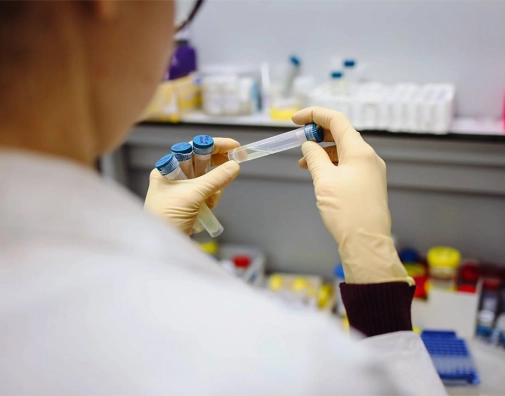
Nutrigenetics: Are We What We Eat?

Adnà Nutrigenetic Report: A Personalized Revolution For Your Health
Every human being is unique, and this uniqueness is reflected right down to the way our bodies react to nutrients - be they fats, carbohydrates, vitamins or minerals. But imagine being able to decode the mysteries of your own genetics to transform your diet into a genuine source of well-being, tailored to your specific needs.
Nutrigenetics offers the opportunity to better understand how your genes influence your nutritional responses. It's also an opportunity to rethink your diet, no longer as a constraint, but as a personalized path to better health. By adjusting your diet according to the particularities of your DNA, you're no longer simply following general recommendations. You're building a lifestyle that suits you, and you alone.
However, it's important to remember that nutrition is a subtle science, influenced by many factors. Your allergies, intolerances, microbiome and lifestyle also play a crucial role in your overall health. Taking these elements into account alongside nutrigenetics allows you to make even more informed and beneficial choices.
Understanding Nutrigenetics: Towards More Balanced Nutrition
Beginning to understand how your DNA impacts your response to food opens the door to wellness you may never have thought possible.
The Mediterranean diet, for example, is often presented as a model of healthy eating, rich in fruit, vegetables, whole grains and olive oil. It promises a reduced risk of heart disease and a longer life expectancy. But did you know that certain genetic variations, such as those in the FTO and APOE genes, can alter your response to this diet? For some, the benefits for weight control and heart health may not be as marked.
When it comes to eating vegetables, we all know they're essential for good health. But a diet low in these nutrients can lead to deficiencies and increase the risk of disease. Genetic factors, such as the TAS2R38 gene that influences our perception of bitterness, can reduce your vegetable intake and, by extension, negatively impact your overall health.
Fatty acids, particularly omega-3 and omega-6, are vital for heart and brain health. An imbalance in their intake can promote chronic inflammation and increase the risk of certain diseases. Variations in the FADS1 and FADS2 genes can alter the way your body metabolizes these fatty acids, which can influence your specific nutritional needs.
A diet too rich in fats, particularly saturated fats, is often associated with obesity and cardiovascular disease. A balanced intake of healthy fats is crucial for the proper functioning of your body. Genes such as APOA5 and LPL, involved in lipid metabolism, can determine how your body handles these fats, and what risks you run if they are out of balance.
Finally, carbohydrates are an indispensable source of energy, but too much of them, especially in refined form, can lead to health problems. It's important to eat whole foods to maintain good blood sugar regulation and digestive health. Genetic variations in the TCF7L2 and PPARG genes can affect the way you metabolize carbohydrates, influencing your sensitivity to insulin and your risk of developing metabolic disorders.
Vitamins and Minerals: The Invisible Guardians of Your Health
Your body depends on an impressive variety of vitamins and minerals to function at its full potential. But did you know that your DNA can influence the way your body absorbs and metabolizes these essential nutrients? This intimate relationship between your genes and your nutrition can reveal a great deal about your health.
Take iron, for example. This mineral is crucial for transporting oxygen and producing energy. Yet genetic variations can affect its absorption, exposing you to an increased risk of anemia or, conversely, iron overload, with all the complications that this can entail.
Calcium, meanwhile, is essential for bone health and proper muscle function. Genetic mutations can compromise your bone density, increasing the risk of osteoporosis. And for calcium to be properly absorbed, vitamins D and C are essential. These vitamins are not just the sunshine vitamin or immunity vitamin, they play a key role in maintaining your overall well-being.
B-complex vitamins - B2, B6, B9 (folate) and B12 - are also essential, contributing to energy production, brain health and red blood cell synthesis. Not forgetting vitamin E, a powerful antioxidant that protects your cells from oxidative stress. Genetic variations can influence the absorption of these vitamins and therefore have a direct impact on your energy levels, cognitive function and even cardiovascular health.
Finally, vitamin K is crucial for blood clotting and bone health. A deficiency in this vitamin could compromise clotting and reduce bone density, exposing you to risks you could avoid.
Your Metabolic Profile: A Mirror of Your Health
Your metabolic profile is one of the most revealing indicators of your overall health, particularly cardiovascular risk. Understanding the importance of HDL cholesterol, LDL cholesterol and triglycerides, and their interaction with your genetic factors, is crucial to maintaining a healthy metabolic balance.
HDL cholesterol, often referred to as “good” cholesterol, helps remove other forms of cholesterol from your bloodstream, reducing the risk of heart disease. Think of it as a vacuum cleaner that cleans your arteries. However, genetic variations can interfere with your HDL levels, compromising its protective function for your cardiovascular health.
On the other hand, LDL cholesterol, also known as “bad” cholesterol, can be harmful, especially at high levels. It acts like concrete in your arteries, promoting plaque build-up and increasing the risk of heart disease and stroke. What's more, high LDL levels are linked to an increased risk of diabetes. Genetic factors can influence LDL levels and metabolism, which can have a direct impact on your risk of cardiovascular disease.
Triglycerides are another type of fat in your blood, and high levels can harden or thicken arterial walls, increasing your risk of stroke, heart attack and coronary heart disease. The relationship between triglycerides, HDL and LDL cholesterol is complex, as they interact with each other and with other cardiovascular risk factors. Genetic variations can affect triglyceride levels and the way your body processes these fats, influencing your overall metabolic health.
Nutrigenetics and the Senses: Flavours that Speak to Your DNA
Your senses, in particular taste and appetite, play a crucial role in your eating habits and preferences. And guess what? Your genes can influence these sensory experiences, modifying your food choices and, by extension, your health.
- Bitter taste: Imagine biting into a kale or endive leaf. The bitter taste you experience may be more or less pronounced depending on your genes, notably due to variations in the TAS2R38 gene. Those who perceive bitterness more intensely may tend to avoid certain green vegetables, thus affecting the quality of their diet.
- Sweet tooth: Are you more the type to go for a nice pastry or a piece of dark chocolate? Your DNA may have something to do with it. Variants in the TAS1R2 and TAS1R3 genes can influence your preference for sweet things. As a result, this can affect your sugar intake and increase your risk of developing health problems such as obesity or diabetes.
- Snacking: Are you more the type to indulge in a little afternoon snack? Here again, your genes may come into play. Variations in genes related to hunger and satiety signals, such as the FTO gene, can influence your tendency to snack between meals. For example, mixed nuts or dried fruit may be frequent choices for some, impacting your caloric intake and weight management.
- Caffeine consumption: Whether you're an espresso lover or a green tea drinker, your genes can determine how you metabolize caffeine. Variants of the CYP1A2 gene can affect the speed at which your body breaks down caffeine. So, for some, a simple cup of coffee could cause palpitations or insomnia, while others can consume it all day without worry.
Weight and Nutrition: Your Worth is Not Measured in Pounds
It's important to remember that your weight doesn't determine your self-worth - it's just a number. However, a drastic change in your weight can be a sign that something isn't quite right, and merits a closer look. Genetics play a key role in how your body reacts to different diets and nutrients. Understanding these influences can help you find the most effective nutritional strategy to manage your weight, without obsession, but with care.
- Diet effectiveness: Your genetic profile can influence your response to different diets, whether it's the Mediterranean, low-fat or low-carb diet. For example, some people may lose weight more effectively on a low-carb diet, while others may benefit more from a heart-healthy Mediterranean diet.
- Predisposition to obesity: Genetics can affect your predisposition to weight gain. Variants in genes such as FTO and MC4R can influence appetite regulation and energy expenditure, increasing the risk of overweight or obesity.
- Difficulty losing weight: For some people, a genetic predisposition makes weight loss more difficult. Variations in genes related to metabolism and fat storage can compromise the effectiveness of weight loss programs.
- Food cravings and emotional eating: Your urges to eat a bag of potato chips or a bar of chocolate when you're stressed can be influenced not only by your environment, but also by your genes. Variants in genes such as DRD2, linked to dopamine signaling, can affect food cravings and emotional eating.
- Feeling full: Do you sometimes find it hard to feel full after a meal? This could be due to genetic factors. Variations in genes such as LEPR, linked to leptin signaling, can interfere with satiety signals and influence your overall food intake.
- Response to monounsaturated fats: Finally, the way your body processes monounsaturated fats, such as those found in olive oil or avocado, can also be influenced by your genes. Certain genetic variants can alter lipid metabolism, impacting your weight and heart health.
Nutrition Test

This test provides details on how your genetics influence the way your body reacts to different types of diet and nutrients.
Adnà's Input
In his book, The Physiology of Taste (1825), the French gastronomer Jean Anthelme Brillat-Savarin coined the famous phrase : "Tell me what you eat and I will tell you who are".
At Adnà, we are firm believers in deepening our understanding as a global community of the complex relationship between science and nutrition.
Food should bring us happiness and support our physical and mental well-being, and Nutrigenetics provides tools to cultivate a positive, proactive approach to diet and health.
Other Journal : Files
VIEW MORE


